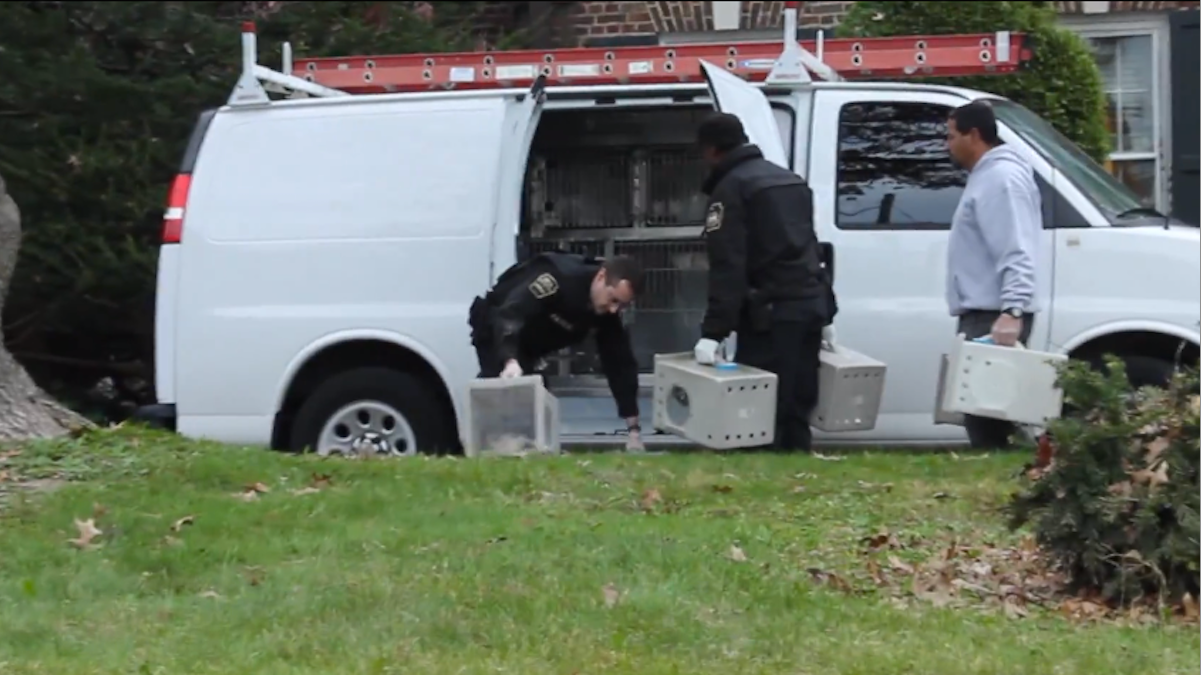Kelly House cat hoarder fined $7K, permitted to have two pets

Cats are removed from the childhood home of Grace Kelly last Halloween. (Matthew Grady/WHYY)
Officer Gregory Jordan got more than he bargained for.
The day before Halloween 2013, the law-enforcement agent for the Pennsylvania Society for the Prevention of Cruelty to Animals (PSCPA), arrived at the East Falls home of Marjorie Bamont to perform an animal-welfare inspection based off a complaint received three months earlier.
Upon entry to Bamont’s stately Henry Avenue house — which happens to be the childhood home of actor and, later, princess Grace Kelly — Jordan noticed an “overpowering” odor of ammonia. As he toured the kitchen, he saw three flea-covered cats, one of whom was lethargic and sickly.
Entering an adjoining room, he observed two animal cages, behind which sat a cat.
Beneath the cat was a second feline whose lifeless body was in such an advanced state of decomposition that only its skeleton and skin remained.
The following day, Jordan returned to serve a search warrant on animal-cruelty charges.
Fourteen living cats, the remains of the deceased cat and one sickly dog were removed from the house.
Bamont, who said she was not missing any cats, was involuntarily committed for a mental-health examination.
Jordan left with fleas on his socks and legs.
The court record
On Thursday, the 82-year-old Bamont pleaded no contest in Common Pleas Court to more than a dozen counts of animal cruelty.
It was the second time that charges related to this episode went before a judge.
At a summary hearing in December, Bamont was found guilty in absentia by Judge Frank Brady, who ordered Bamont to pay $10,000 in restitution to the PSPCA.
Bamont was also banned from owning animals for approximately four years, forfeiting the 14 cats and one dog seized to the PSPCA.
Neither Bamont nor her attorney Jack McMahon appeared at the December hearing. At the time, a representative from McMahon’s office said that the absence resulted from a clerical error and an illness from which Bamont was suffering.
However, it was said at the time that an appeal to Brady’s decisions would be filed based solely on the “clerical oversight.” Attorneys for the PSPCA suggested in December that the no-show was a ploy.
Their speculation was verified by new defense attorney Lawrence Bozzelli, who told Judge Joan Brown on Thursday that Bamont was told by her attorney not to appear in December.
New details made public
While these legal wranglings delayed the case by several months — the confiscated animals continued to be housed and cared for by the PSPCA — prosecutors had ample physical evidence and medical documentation to reinforce their case.
During the October search at Bamont’s house, law enforcement and medical staff from the PSPCA observed fleas, feces and the overpowering smell of cat urine both in the kitchen and an upstairs bedroom and its adjoining bathroom.
Bamont was issued seven citations for unsanitary conditions and two citations for lack of veterinary care. Ultimately, there were more citations to come, based off of physical examinations conducted by the PSPCA.
Among the medical findings:
— An emaciated cat, dubbed “Flipwick” by the PSPCA, was experiencing both shock and renal failure. Despite a blood transfusion, the cat was euthanized the day after being removed from Bamont’s house.
— “Dahling” was underweight, dehydrated and had an upper-respiratory infection.
— “Blitz” had conjunctivitis, an upper-respiratory infection and such advanced dental disease that pain medication was necessary for chewing.
— “Luna Lovegood” also had an upper-respiratory infection along with severe fleas, dental disease, tapeworms and was anemic.
— “Poppy Palmfree” was dehydrated, flea-ridden and underweight.
— “Larry David” had an upper-respiratory infection, fleas and earmites.
— “Beatrix LeStrange,” had pain while walking. Examination revealed bone cancer, necessitating an amputation.
— A dog discovered sitting in Bamont’s parked car (she wasn’t home at the time) tested positive for Lyme Disease and had extensive dental problems. In addition, the dog had skin disease and fecal matting.
Dr. JoEllen Bruinooge of the PSPCA said that while senior cats are more prone to disease and illness, many of the conditions found on the pets – particularly fleas and earmites – do not occur in sanitary conditions.
“Fleas sucking blood and causing anemia, that’s a severe condition,” Bruinooge said.
What each side sought
Given these conditions, Assistant District Attorney Courtney Malloy asked Brown to impose a sentence of 90-day per-animal prohibition on pet ownership, totaling a shade over three years and two months.
In addition, Malloy sought forfeiture of the 14 living animals and full restitution of the $24,005.57 that the PSPCA spent providing care to the pets.
“Ms. Bamont might love these animals, but she did not care for them,” Malloy said, adding that the lack of care rose to the criminal level.
Bamont’s defense centered on the limited scope of her offenses.
When cross-examined by Bozzelli, Jordan acknowledged that the rooms in the house without the cats were not in the same condition, and that no breathing apparatus was required when removing the pets.
Bozzelli noted that there was little existing case law regarding pet care, and summarized what does exist as addressing instances of “wanton neglect.” He emphasized that the pets were given shelter, food, water and had access to litter boxes.
Accordingly, Bozzelli requested a reduction in restitution, hinging the request on the delays imposed by Bamont’s former attorney and her limited finances. He also asked for the return of several cats and expressed a willingness to permit regular inspection of the premises.
“She loved these cats as if they were her children,” he said of Bamont. “For her, she did the best she could at her age.”
Time for sentencing
When imposing sentence, Brown acknowledged Bamont’s fondness for her pets, but questioned the ability of the octogenarian to provide proper care for such a large number of them.
Allowing Bamont two cats, Brown imposed bi-weekly inspections, the forfeiture of all other animals and $7,000 in restitution.
While Brown was rendering her sentence, Bamont spoke up for the first time. She said that she had arranged for daily pet care.
“I need my dog back,” she said. “I need my constant companion.”
However, Brown was unmoved.
“You need to do a better job caring for them,” the judge told her.
Bamont can ask for a reconsideration of sentence or can appeal to a higher court.
Bozzelli told NewsWorks after sentencing that his client has yet to determine whether to go forward with additional action.
WHYY is your source for fact-based, in-depth journalism and information. As a nonprofit organization, we rely on financial support from readers like you. Please give today.




